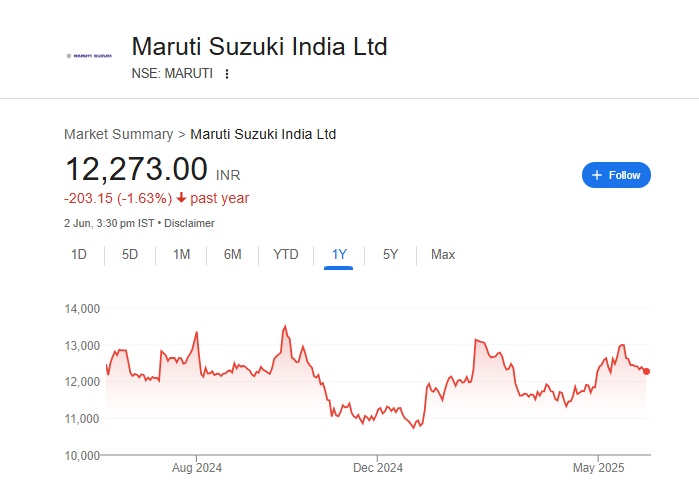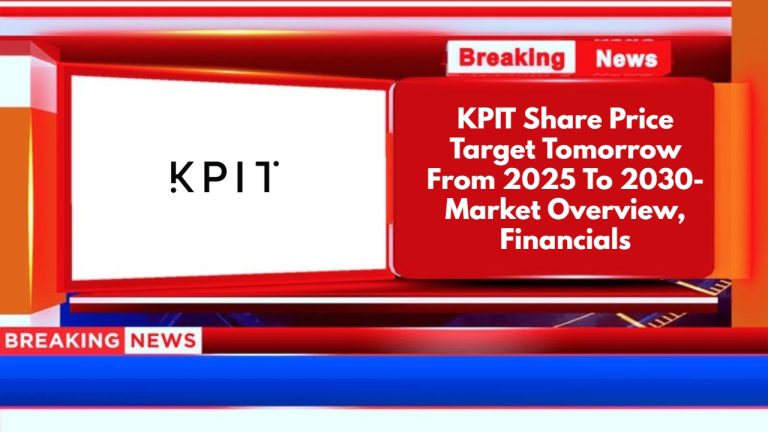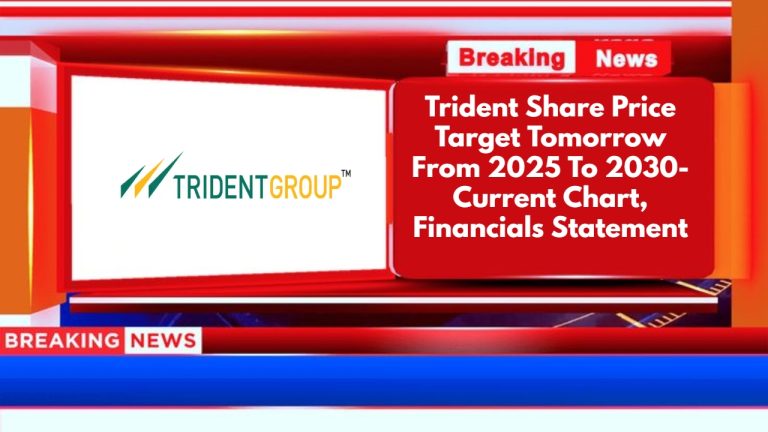Maruti Suzuki Share Price Target Tomorrow From 2025 To 2030- Market Overview, Financials
Maruti Suzuki is one of the most trusted car brands in India, known for making affordable, reliable, and fuel-efficient vehicles. Over the years, it has won the hearts of millions of customers with its wide range of cars and excellent after-sales service. People appreciate Maruti Suzuki for its low maintenance costs, strong mileage, and easy availability of service centers. Maruti Suzuki Share Price on NSE as of 03 June 2025 is 12,273.00 INR. This article will provide more details on Maruti Suzuki Share Price Target 2025, 2026 to 2030.
Maruti Suzuki Developers Ltd: Company Info
- Founded: 24 February 1981, Gurugram
- Founder: Government of India
- Headquarters: New Delhi
- Number of employees: 18,228 (2024)
- Parent organization: Suzuki
- Revenue: 1.46 lakh crores INR (US$18 billion, 2024)
- Subsidiaries: True Value Solutions Ltd.
Maruti Suzuki Share Price Chart

Maruti Suzuki Share: Market Overview
- Open: 12,161.00
- High: 12,319.00
- Low: 12,132.00
- Mkt cap: 3.86LCr
- P/E ratio: 26.61
- Div yield: 1.10%
- 52-wk high: 13,680.00
- 52-wk low: 10,725.00
Maruti Suzuki Share Price Target Tomorrow From 2025 To 2030
Here are the estimated share prices of Maruti Suzuki for the upcoming years, based solely on market valuation, enterprise trends and professional predictions.
- 2025 – ₹13,700
- 2026 – ₹14,000
- 2027 – ₹14,250
- 2028 – ₹14,500
- 2029 – ₹14,750
- 2030 – ₹15000
Maruti Suzuki Share Price Target 2025
Maruti Suzuki share price target 2025 Expected target could be between ₹13,670 to ₹13,700. Here are 7 key factors affecting the growth of Maruti Suzuki’s share price target for 2025:
-
Rising Demand for Passenger Vehicles
As income levels rise and more people buy personal vehicles, Maruti Suzuki could benefit from higher car sales across India. -
New Product Launches
Launching new models with modern features, safety upgrades, and fuel efficiency can attract more customers and boost sales. -
Electric Vehicle (EV) Strategy
Maruti’s progress in the EV segment will play a major role in long-term growth. Successful entry into EVs can increase investor confidence. -
Strong Dealer and Service Network
Maruti has one of the largest sales and service networks in India, which gives it a big advantage in reaching more customers, even in rural areas. -
Raw Material Price Trends
Stable or falling prices of key materials like steel and aluminum can help reduce manufacturing costs and improve profit margins. -
Exports and Global Markets
Growth in exports and expansion into new international markets can provide additional revenue streams and reduce reliance on domestic sales. -
Supportive Government Policies
Policies such as vehicle scrappage schemes, subsidies for hybrid/EVs, and incentives for local manufacturing can support Maruti’s growth.
Maruti Suzuki Share Price Target 2030
Maruti Suzuki share price target 2030 Expected target could be between ₹14,950 to ₹15,000. Here are 7 key risks and challenges that could affect Maruti Suzuki’s share price target by 2030:
-
Slow Transition to Electric Vehicles (EVs)
If Maruti Suzuki is late in launching competitive EVs, it may lose market share to companies that are already ahead in the EV space. -
Rising Raw Material Costs
Increasing prices of steel, aluminum, lithium (for EVs), and other materials can reduce profit margins and increase vehicle prices. -
Intense Market Competition
Global players like Tesla, Hyundai, and local rivals like Tata Motors are rapidly growing in India. This rising competition may affect Maruti’s market dominance. -
Changing Consumer Preferences
More buyers are now choosing SUVs, EVs, and high-tech vehicles. If Maruti fails to adapt quickly to these trends, it could lose customers. -
Strict Emission and Safety Norms
Tougher environmental and safety regulations will require Maruti to invest more in technology, which can increase production costs. -
Supply Chain Disruptions
Issues like semiconductor shortages or delays in global parts supply can affect production and delivery timelines. -
Global Economic and Geopolitical Risks
Economic slowdowns, inflation, or global conflicts can reduce demand for vehicles and affect Maruti’s export and production plans.
Shareholding Pattern For Maruti Suzuki Share
| Held By | Mar 2025 |
| Promoters | 58.28% |
| Flls | 14.96% |
| Dlls | 23.64% |
| Public | 3.12% |
Maruti Suzuki Financials
| (INR) | Mar 2025 | Y/Y change |
| Revenue | 409.20B | 6.37% |
| Operating expense | 86.74B | 47.36% |
| Net income | 39.11B | -1.04% |
| Net profit margin | 9.56 | -6.91% |
| Earnings per share | 118.04 | -4.30% |
| EBITDA | 47.84B | -10.18% |
| Effective tax rate | 20.47% | — |
Read Also:- Trident Share Price Target Tomorrow From 2025 To 2030- Current Chart, Financials Statement







